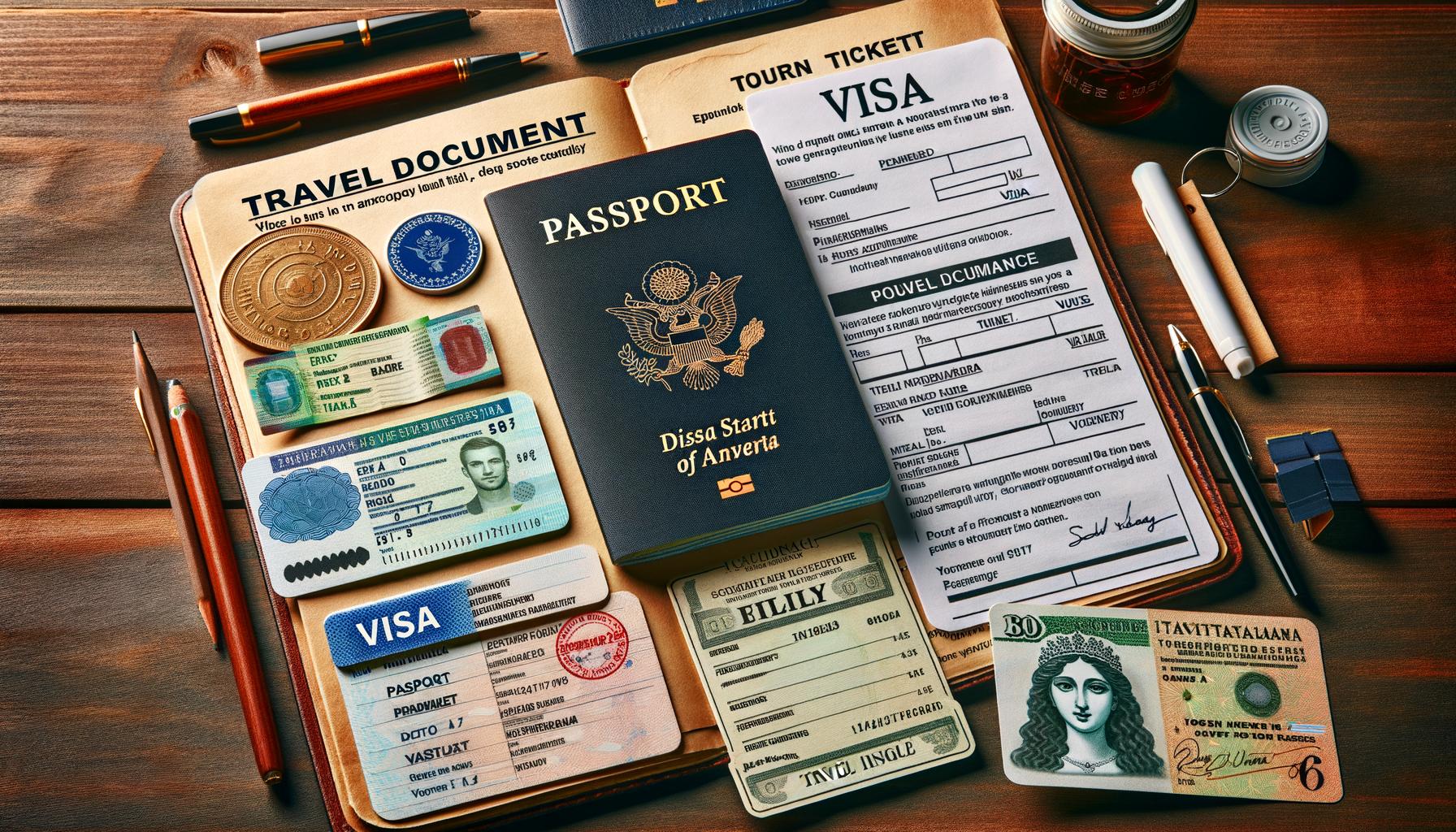Italy is a popular destination for travelers from around the world, known for its rich history, stunning landscapes, and delicious cuisine. Before embarking on a trip to Italy, it’s important to ensure that you have all the necessary travel documents in order. This article will provide an overview of the various documents required for traveling to Italy, including passport and visa requirements, as well as additional considerations such as travel insurance and health documents.
First and foremost, it’s essential to understand the Schengen Visa, which allows non-EU citizens to travel within the Schengen area, including Italy. Additionally, passport requirements for traveling to Italy will be discussed in detail to ensure that travelers have a valid passport with sufficient validity remaining. The article will also delve into visa requirements for non-EU citizens, outlining the specific criteria and application process for obtaining a visa to visit Italy.
Furthermore, this article will cover the importance of travel insurance and health documents when visiting Italy, as well as any additional documents needed for minors traveling to the country. Lastly, readers can expect a comprehensive document checklist for traveling to Italy and helpful tips for smooth document preparation. Whether you’re planning a leisurely vacation or embarking on a business trip to Italy, this guide will provide valuable insights into ensuring that you have all necessary travel documents in place.
Understanding the Schengen Visa
Traveling to Italy as a non-EU citizen requires understanding the Schengen Visa, which is essential for entry into the country. The Schengen Visa is a short-stay visa that allows travelers to visit any of the 26 countries in the Schengen area, including Italy. This visa is typically valid for a stay of up to 90 days within a 180-day period, allowing visitors to travel for tourism, business, or family visits.
It’s important to note that the type of Schengen Visa needed for Italy travel depends on the purpose and duration of the trip. For example, travelers may apply for a single-entry visa if their visit is limited to Italy only, while a multiple-entry visa may be required for those planning to visit multiple Schengen countries during their trip.
When applying for a Schengen Visa for Italy, non-EU citizens will need to provide certain documents such as a completed application form, passport-sized photographs, proof of travel arrangements and accommodation bookings, travel insurance covering medical expenses and repatriation, and evidence of financial means to support the stay in Italy. Additionally, applicants may be required to provide a cover letter explaining the purpose of their visit and itinerary details.
Overall, obtaining a Schengen Visa for Italy involves thorough preparation and submission of necessary documentation. It’s crucial for non-EU citizens planning to travel to Italy to familiarize themselves with the specific requirements for their individual circumstances in order to ensure a smooth application process.
Passport Requirements for Traveling to Italy
When traveling to Italy, one of the most important travel documents you will need is a valid passport. For citizens of the United States, a passport that is valid for at least three months beyond the date of intended departure from the Schengen area is required. It is crucial to ensure that your passport will remain valid for the duration of your stay in Italy and other Schengen countries.
In addition to having a valid passport, travelers to Italy should also be aware of the Schengen Agreement. This agreement allows visitors to travel freely within the 26 European countries that are part of the Schengen Zone. Most non-EU citizens who are planning to visit Italy for tourism, business, or family visits can enter with a Schengen visa, which allows stays up to 90 days within a 180-day period.
For travelers from non-Schengen countries who plan to visit Italy, it is important to check if they need a Schengen visa and what specific requirements apply. Each country has its own rules and regulations regarding visas for entry and it’s essential to research these in advance. Additionally, it’s good practice for all travelers – regardless of their home country – to check with their nearest Italian consulate or embassy for any specific visa requirements pertaining to their trip.
| Passport Requirement | Details |
|---|---|
| Validity | 3 months beyond intended departure from the Schengen area |
| Schengen Visa | Allowing stays up to 90 days within a 180-day period |
Visa Requirements for Non-Eu Citizens
When planning a trip to Italy, non-EU citizens need to be aware of the specific visa requirements that apply to them. The Schengen Visa is a key document that allows travelers from certain countries to enter and travel within the Schengen Area, which includes Italy.
This visa is essential for visitors who are not citizens of EU member states, as well as some other exempted countries. It is important to research whether your country of citizenship requires a Schengen Visa for entry into Italy and plan accordingly.
In addition to the Schengen Visa, non-EU citizens must ensure that their passport meets Italy’s entry requirements. Your passport should be valid for at least three months beyond your intended stay in Italy.
It is also advisable to have at least two blank pages in your passport for entry and exit stamps. Failure to meet these requirements could result in being denied entry into Italy, so it is crucial to check these details well in advance of your trip.
Apart from the Schengen Visa and passport requirements, non-EU citizens traveling to Italy should also be aware of any additional documents that may be required. Depending on the purpose of your visit, you may need to provide supporting documents such as a letter of invitation, proof of accommodation, or evidence of financial means. Researching and preparing these documents ahead of time can help ensure a smooth and hassle-free travel experience.
Travel Insurance and Health Documents
Italy is one of the most popular tourist destinations in the world, known for its rich history, stunning architecture, and delicious cuisine. When planning a trip to Italy, it is essential to ensure that you have the necessary travel documents and health insurance to enjoy a smooth and stress-free vacation.
One important aspect of travel preparation for Italy is obtaining adequate travel insurance and health documents. While Italy does not require travelers to have specific health insurance coverage, it is highly recommended to purchase a comprehensive travel insurance plan that includes medical coverage. This will provide peace of mind in case of unexpected illness or injury while traveling in Italy.
In addition to travel insurance, it is also advisable to carry a European Health Insurance Card (EHIC) if you are a citizen of an EU member state. The EHIC allows access to state-provided healthcare during temporary stays in other European Economic Area (EEA) countries or Switzerland. However, it’s important to note that the EHIC is not a substitute for travel insurance and may not cover all medical costs or repatriation.
Another important consideration for health documents when traveling to Italy is any required vaccinations. While there are no mandatory vaccinations for travelers entering Italy from the United States or other Western countries, it’s always wise to check with a healthcare provider or visit the Centers for Disease Control and Prevention (CDC) website for up-to-date information on recommended vaccinations for international travel.
| Document | Description |
|---|---|
| Travel Insurance | A comprehensive plan that includes medical coverage |
| European Health Insurance Card (EHIC) | Allows access to state-provided healthcare during temporary stays in EEA countries or Switzerland |
| Vaccinations | Recommended vaccinations for international travel; check with healthcare provider or CDC website |
Additional Documents Needed for Minors
Traveling to Italy with minors requires additional documents to ensure a smooth and hassle-free trip. Whether you are traveling with your own children or are responsible for minors, it is important to be aware of the necessary paperwork. Here are the additional documents needed for minors when traveling to Italy:
- Child’s Passport: All minors, regardless of their age, are required to have their own passport when traveling internationally. It is important to check the expiration date of the child’s passport as some countries require at least six months validity beyond the date of return.
- Parental Consent Form: If a child is traveling without both parents or legal guardians, it is important to have a notarized parental consent form from the absent parent(s) or legal guardian(s). This document should outline the child’s travel details and provide consent for them to travel abroad.
- Birth Certificate: Some airlines and immigration authorities may require a copy of the minor’s birth certificate as proof of parentage. It is advisable to carry a certified copy of the child’s birth certificate when traveling with minors.
It is essential to ensure that all necessary documents for minors are in order before embarking on your journey to Italy. Failure to comply with these requirements could result in delays or even denial of entry into the country. Additionally, keeping copies of these documents and storing them separately from the originals can prove helpful in case of loss or theft.
Remember that requirements may vary based on your nationality and individual circumstances, so it is always best to check with the Italian embassy or consulate in your home country regarding what travel documents are needed for Italy specifically for minors. Taking these extra steps in document preparation can help make your trip with minors as smooth as possible.
Document Checklist for Italy Travel
When traveling to Italy, there are several important documents that you will need to ensure a smooth and hassle-free trip. This document checklist for Italy travel will help you prepare and gather all the necessary paperwork before your departure.
Passport and Visa
One of the most crucial travel documents needed for Italy is a valid passport. Make sure your passport is valid for at least three months beyond your planned date of departure. Additionally, non-EU citizens may need to obtain a Schengen Visa for short-term stays in Italy. The Schengen Visa allows travelers to visit all 26 countries in the Schengen Area with a single visa, making it a convenient option for those planning to explore multiple European destinations.
Travel Insurance and Health Documents
Travel insurance is highly recommended when traveling to Italy. While not mandatory, having travel insurance can provide coverage for medical emergencies, trip cancellations, lost luggage, and other unexpected events. It’s also important to carry any necessary health documents, such as prescriptions or medical records, especially if you have pre-existing conditions or require specific medications.
Additional Documents Needed for Minors
If you are traveling with minors (under 18 years old), there are additional documents required for their entry into Italy. This may include a consent letter from the non-accompanying parent(s) or legal guardian(s), as well as a copy of the child’s birth certificate. Be sure to check the specific requirements with the Italian embassy or consulate in your country.
Ensuring that you have all the necessary travel documents for Italy will help avoid any unnecessary stress or delays during your trip. By following this checklist and being proactive in gathering essential paperwork, you can look forward to a smooth and enjoyable travel experience in Italy.
Tips for Smooth Document Preparation for Italy Travel
When getting ready for a trip to Italy, it’s important to make sure you have all your travel documents in order. Whether you’re a seasoned traveler or a first-time tourist, here are some tips to help ensure that your document preparation goes smoothly.
Research Italian Entry Requirements
Before you start preparing your travel documents for Italy, it’s important to understand the entry requirements for the country. This includes knowing what type of visa, if any, you will need based on your nationality and the purpose of your visit. Additionally, familiarize yourself with any specific passport requirements and any other documentation needed for entry into Italy.
Start Early
Gathering all the necessary travel documents can be time-consuming, so it’s best to start early to avoid any last-minute stress. This allows ample time to apply for visas, renew passports if needed, and obtain any other required documentation. Starting early also gives you time to address any unforeseen issues that may arise during the document preparation process.
Stay Organized
Keep all your travel documents in a safe and organized place, such as a travel wallet or folder. This will help ensure that you have everything you need when it’s time to depart for Italy. It’s also recommended to make copies of all your important documents and keep them separate from the originals as a precautionary measure.
Remembering these tips can help make the process of gathering travel documents for Italy smooth and stress-free. By taking the time to research entry requirements, starting early, and staying organized, you can set yourself up for a successful and enjoyable trip to this beautiful European destination.
Conclusion and Additional Resources for Travel Document Information
In conclusion, traveling to Italy requires careful consideration and preparation of the necessary travel documents. Understanding the Schengen Visa and passport requirements is crucial for a smooth entry into the country. Non-EU citizens must also be aware of specific visa requirements, while all travelers should ensure they have the appropriate travel insurance and health documents in place.
For those traveling with minors, it’s important to remember that additional documents will be needed, so it’s essential to plan ahead and gather all necessary paperwork. To support this effort, a document checklist specifically tailored for Italy travel can help ensure that nothing is overlooked in the preparation process.
In order to avoid any last-minute difficulties or delays when traveling to Italy, it is recommended to start preparing travel documents well in advance of the trip. By familiarizing oneself with the required documentation and following helpful tips, such as making copies of important documents and double-checking all visa and passport expiration dates, travelers can minimize stress and enjoy a seamless journey.
For further information on what travel documents are needed for Italy, additional resources such as the Italian Embassy or Consulate websites can provide valuable guidance and assistance.
Frequently Asked Questions
What Documents Do I Need to Travel to Italy?
When traveling to Italy, you will typically need a valid passport. For citizens of the United States, a visa is not required for stays up to 90 days. However, it’s essential to check the specific entry requirements based on your nationality.
What Documents Need to Fly in Italy?
If you are flying within Italy, you will generally need a form of government-issued identification. This could be your passport if you are an international traveler or another acceptable form of ID if you are a resident or citizen of Italy.
What Do You Need for a Trip to Italy?
When planning a trip to Italy, it’s important to have the necessary travel documents in place, such as a valid passport and any required visas. Additionally, consider bringing travel insurance, local currency, and any prescription medications you may need. It’s also wise to have electronic copies of important documents in case of loss or theft while traveling.

I’m a passionate traveler, writer, and Italophile. My fascination with Italy’s history, art, and culture has led me on countless adventures across the Italian landscape. Through “I Live Italy,” I share my love for this extraordinary country and aims to inspire others to explore its boundless beauty.





